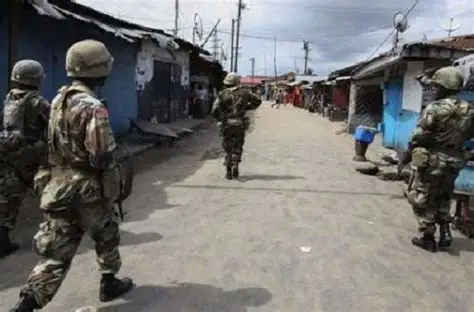Published
7 months agoon
By
Adubianews
As Bawku grapples with renewed violence, a peace advocacy group has stepped forward with a structured strategy aimed at ending the decades-long conflict. The Global Security for Africa, Research and Good Governance (GLOSARGG) has presented an eight-point peace roadmap, following the latest clashes that claimed at least six lives, an incident allegedly linked to military operations in the area.
Bawku, a hotspot of ethnic and chieftaincy tensions, has suffered the loss of hundreds of lives over the years, with businesses and property repeatedly destroyed. Currently, Otumfuo Osei Tutu II, the Asantehene, is leading a separate mediation effort to resolve the conflict.
While supporting ongoing interventions, Francis Ahovi, Executive Secretary of GLOSARGG and a security analyst, stressed the need for grassroots approaches.
“To address the Bawku conflict, strategies should be looked at from a local communal or chieftaincy-based conflict point of view,” he said.
Ahovi and GLOSARGG’s proposed eight-point roadmap includes:
Multi-Stakeholder Conflict Resolution Taskforce
The taskforce would involve traditional leaders from both factions, the National Peace Council, REGSEC, civil society, youth, and religious groups. Its mandate: mediate grievances, build consensus on chieftaincy and land disputes, and create a peacebuilding timeline.
Community-Based Intelligence Team
Locally trained volunteers would monitor and report early warning signs of violence using tools such as WhatsApp tip-offs and community radio, reporting to district peace committees.
Temporary Localised Curfew and Controlled Movement
Curfews in high-risk areas would help prevent night-time mobilizations by armed groups while keeping access open for essential services. These measures would be lifted gradually as peace indicators improve.
Disarmament and Demobilisation of Armed Youth
GLOSARGG suggests a community-based amnesty program that encourages young people to surrender weapons in exchange for reintegration support, working with police and NGOs to map and engage armed groups.
Civic and Peace Education Campaigns
Through community theatre, radio broadcasts, mosque and church announcements, the campaign would target youth and local vigilantes with messages promoting unity, peace, and the costs of continued violence.
Conflict Early-Warning and Response System (CEWER)
Led by the National Peace Council and NCCE, this system would provide real-time alerts, dialogue sessions, and intelligence-sharing with REGSEC to anticipate and manage emerging threats.
Dialogue-Based Leadership Succession for Chieftaincy Conflicts
GLOSARGG recommends reforms in traditional councils with legal backing from the House of Chiefs and the Ministry of Chieftaincy to clearly define and register mutually accepted leadership claims.
Monitoring and Evaluation of Peace Agreements
Quarterly reviews involving local peace actors and observers would assess compliance, uncover emerging risks, and guide timely adjustments to peace strategies.
Ahovi believes that with local ownership, structured mediation, and consistent evaluation, the Bawku conflict can be resolved sustainably.

























